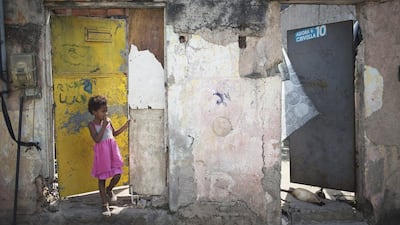RIO DE JANEIRO // Back in 2002, a multi-award-winning film made Cidade de Deus famous. The hard-hitting tale of gang life shot in a Rio favela (slum), based on a book written by a favelado (favela-dweller) and using real favelados as actors, captivated cinema-audiences and critics alike with its realistic portrayal of the everyday violence of ghetto life.
But today Cidade de Deus, which means “City of God” feels more Godforsaken than blessed. Once it was considered a model of the government’s efforts to curb the criminality with an established police presence – so much so that president Barack Obama visited in 2011 and played football with local youngsters. But today, violence rules once again.
“Violence levels were better all over for a few years. We had no incidents for months,” said Sergio Leal, a favela resident. “Now, every week, there is a shoot-out somewhere in City of God.”
There was a shoot-out between criminals and the police only the day before the Games opened. Shooting happens even in front of children walking home from school. They don’t bat an eyelid.
True, there are modest community programmes aimed at preventing children from being sucked into a world of drug lords and their gun-laden vendettas, leading inexorably to an early and bloody death. Coincidentally, Fernando Meirelles, who directed the film, helped create the opening ceremony for the Rio Olympics, which featured a segment about the favelas. City of God has even produced Brazil’s first gold medallist of the Rio Games. Judo champion Rafaela Lopes Silva, 24, grew up in poverty in Cidade de Deus and learnt her sport in street scraps and then, more formally, in a favela judo club. If not for judo, she would still be there, as she admitted tearfully on receiving her medal, which she now adds to the World Championship gold she won in 2013.
No matter how many awards the film garnered, there aren’t many Rafaelas among the 50,000 souls living in Cidade de Deus. While other parts of Rio have been spruced up, the only mark the Olympics has made on Cidade de Deus is the dedicated traffic lane for accredited vehicles to drive past as fast as they can.
Sergio Leal quotes from a hip-hop song to sum up local feelings about the Olympics. “‘Look at the black kid watching it all from the outside.’ We are all watching it from the outside here.”
It was not meant to be this way. Unlike the 600-plus other favelas in Rio, Cidade de Deus started life in the 1960s as a social housing complex on the western edge of the city, far from the tourist beaches and populated with people evicted from existing shacks. Where most favelas snake up Rio’s hillsides, Cidade de Deus was laid out in horizontal streets. It was part of an attempt to “beautify” the city by moving the poor out of sight, according to Mariana Dias Simpson of the Brazilian Institute of social and Economic Analyses. But Cidade de Deus kept growing and became a favela again.
In 2008, the government created police pacification units or UPPs to try to curtail violence in the favelas. Police stations opened, weapons were confiscated and the police took over territory previously controlled by the criminals. Cidade de Deus was among the first communities to get a UPP. For a time, it worked, which is when the US president came visiting with the First Lady and their two daughters.
“We used to go to the Americans to try to establish a relationship. And now they come to us,” said one shopkeeper at the time.
It was a high point, however, and the only way was down. The criminals were too many, the police too few.
Unemployment in Brazil is at 8.1 per cent, the highest level since 2009, and favela-dwellers face some prejudice from employers. The drugs business, however, offers opportunities for all and they get them young, recruiting children as lookouts or “avioezinhos” – meaning “little planes”.
However Juliana Barbassa, author of the book Dancing With The Devil In The City Of God, about the favela, points out the great majority of those living there and in other shantytowns have no involvement in crime at all. "Go to the most dangerous favela on a weekday, and you will see mothers going to work and men dressed for their construction jobs," she said. "This is essentially home to the working class of Rio."
But they are still kept apart from “respectable” Rio.
“They were promised more mobility, more investment in sport and security, “ said urban planner Christpher Gaffney. “They were also promised to be part of a tourism programme that would help people in the region become tour guides for Rio, just like in other communities. None of those materialised. The rapid-transit bus that could have integrated that region to the rest of Rio doesn’t have any stops in City of God. With no integration, there is even more segregation.”
All Cidade de Deus got from the government was a few pairs of boxing gloves and bags for the boxing club run by a volunteer, Leo Sagat, a former resident. The clubroom has no conditioning and though it is supposedly in one of the safer parts of the favela, nicknamed “Switzerland” there are cocaine dealers next door.
Life in the favela is “not what we saw in the movie, but it is not promising either”, said resident Sergio Leal. No horror story, then, but no fairy tale either.
* Associated Press

